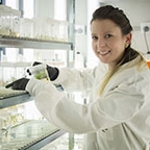Queensland Alliance for Agriculture and Food Innovation (QAAFI)
The University of Queensland
QAAFI is a world leading research institute for sustainable tropical and sub-tropical agriculture and food production. Combining the scientific expertise from The University of Queensland and the Queensland Government since 2010, QAAFI has four research centres including animal, crop, horticultural, and food and nutritional sciences. QAAFI uses artificial intelligence, nanotechnology, genomics, gene editing and big data to produce safer, nutritious food, using less resources. UQ is number one for agricultural science in Australia and globally is consistently one of the highest ranked institutions in agriculture. Using our research facilities throughout tropical and subtropical environments in Queensland, QAAFI is well placed to deliver agriculture and food science to improve the productivity, competitiveness and sustainability for food, fibre and agribusiness industries.
- Website
- https://qaafi.uq.edu.au/
- Organisation type
- University research centre
- Queensland government – partner
- Number of research staff
- 300-500 research staff
- Address
- Queensland Bioscience Precinct, 306 Carmody Road, St Lucia QLD 4067
Strengths and capabilities
- Plant breeding and genetics
- Plant health
- Crop physiology and modelling
- Soil science
- Predictive agriculture
- Farming systems science
- Food quality and human nutrition
- Sensory and consumer science
- Animal breeding and genetics
- Animal health
- Animal nutrition
- Animal welfare
- Biosecurity
- Crop protection
Facilities and major equipment
- Queensland Bioscience Precinct, St Lucia
- Ecosciences Precinct, Dutton Park
- Health and Food Sciences Precinct, Coopers Plains
- Hartley Teakle Building, St Lucia
- Gatton Research Station
- UQ Long Pocket Campus
Lead researchers
- Professor Ben Hayes developed multi-breed genomic estimated breeding values for composite and crossbred cattle that have been commercialised. These approaches have application in global tropical/subtropical production systems.
- Dr Bruce Topp contributes into the National Macadamia Breeding Program that has produced four elite cultivars released by DAF to industry. Over 10,000 trees have been sold of one particular cultivar due to its smaller tree size and suitability for high density planting.
- Professor Heather Smyth has developed a platform to transform raw materials into distinctive Australian foods by working with industry to characterise composition and properties, identify nutritional value, produce products and validate them in the market.
- Professor Ala Tabor was a panel member for the Food and Agriculture Organization (FAO), part of the United Nations. The panel was tasked with enabling sustainable livestock production by improving tick control and acaricides through resistance management.
- Dr Alice Hayward and the QAAFI Tissue Culture team have commercialised propagation methods for five avocado rootstock cultivars within three countries. This has total expected benefits of $23.27 million (present value terms) for Australia alone, with methods currently being translated to macadamia and other important Australian horticultural plants.
Achievements of the centre
- In conjunction with the Queensland Government, led the development of the Zero Net Emissions from Agriculture Cooperative Research Centre – a $300M cash and inkind initiative to drive emission reductions across the agricultural sector
- Driving genomic based breeding innovations to improve the Australian livestock sector
- Recipient of Bill and Melinda Gates Foundation funding of A$6.4 million to improve sorghum breeding programs in Africa
- Supported by industry, developing advanced plant and animal breeding technologies, strategies and training for major Australian agriculture sectors through an ARC Training Centre in Predictive Breeding for Agricultural Futures
- Accelerating the development of an Indigenous-led native food industry through partnerships, targeted food and nutrition research and developing markets and value chains.
Key science sectors
More information about the sectors this centre is involved in:
- Advanced manufacturing
- Biotechnology
- Digital economy
- Environment and nature
- Food and agriculture
- Tropical
Update details
Is this your centre? See any issues? Send a request to update your listing.
